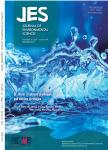Seasonal bioconcentration of heavy metals in Onchidium struma(Gastropoda:Pulmonata)from Chongming Island,the Yangtze Estuary,China
Seasonal bioconcentration of heavy metals in Onchidium struma(Gastropoda:Pulmonata)from Chongming Island,the Yangtze Estuary,China作者机构:School of Life Science East China Normal University Shanghai 200062 China College of Aqua-life Science and Technology Shanghai Ocean University Shanghai 200090 China
出 版 物:《Journal of Environmental Sciences》 (环境科学学报(英文版))
年 卷 期:2009年第21卷第2期
页 面:255-262页
核心收录:
基 金:supported by the Shanghai Key Projectfor Developing Agriculture by Science and Technology(No. 2005D4-3) the National Natural Science Foundation of China (No. 30671607)
主 题:Onchidium struma heavy metal bioconcentration the Yangtze Estuary
摘 要:The seasonal concentration changes of selected heavy metal Cd, Cr, Cu, Fe, Mn, Pb, and Zn in five tissues of marine gastropod Onchidium struma were studied in the Chongming Island, the Yangtze Estuary in April 2007, July 2006, September 2006, and November 2006, respectively. The results demonstrated that the bioconcentration factor of Cu (biomass/water) in all selected tissues was about 104 magnitudes, Fe and Cd were 103, Zn was 102, and Mn, Pb, and Cr were 101. Hepatopancreas was proven to be the dominant storage tissue of Cr, Cu, Mn, and Zn, whereas Fe and Pb were mainly stored in muscle and digenetic gland, and Cd was stored in vitelline gland and albumen gland. Additionally, it was found that Cu, Fe, Mn, and Zn were concentrated significantly by O. struma (whole-body) in summer or autumn, and Cd, Cr, and Pb increased slightly in spring and winter. Furthermore, the bioconcentration of Cr was nearly 2-fold higher and Zn was 1.6-fold higher in the water compared with the Water Quality Standard for Fisheries. With view of excessive amount of Pb, Cd, and Cu according to seafood standard, the consumption of O. struma might have the risk of health hazard.



